1. If, according to what the apostle says in 2 Corinthians, 3,3, they have in themselves the letter of God, not written with ink, but with the spirit of God, and not on stone tablets, but in the meat tables of the heart, that they stop adoring the letter and worrying so much about it. ~ Baruch Spinoza

2. Our method of interpreting scripture is the best. Because, since the maximum authority to interpret the scripture is in the power of each one, the standard of interpretation should not be anything other than natural light, common to all, and not a light superior to nature or any external authority. ~ Baruch Spinoza

3. The great secret of the monarchical regime and its greatest interest consist in keeping men deceived and in disguising, under the specious name of religion, the fear with which it wants to control them, so that they fight for their slavery, as if it were about your salvation, and do not consider it a shame, but the highest honor, to give your blood and your soul for the pride of a single man. ~ Baruch Spinoza

4. The natural right of each man is not determined, then, by sound reason, but by desire and power. ~ Baruch Spinoza

5. If it were as easy to command over souls (animus) as over tongues, the whole world would reign with security and no State would be violent, since everyone would live according to the opinion of those who command and only according to their decision would they judge what is true or false, good or bad, equitable or iniquitous. ~ Baruch Spinoza

5. If it were as easy to command over souls (animus) as over tongues, the whole world would reign with security and no State would be violent, since everyone would live according to the opinion of those who command and only according to their decision would they judge what is true or false, good or bad, equitable or iniquitous. ~ Baruch Spinoza

6. If no one can renounce their freedom to express their opinion and think what they want, but each one is, by the supreme right of nature, master of their thoughts, it follows that one can never attempt in a state, without condemning oneself to a resounding failure, that men only speak by prescription of the supreme powers, even if they have different and even contrary opinions. ~ Baruch Spinoza
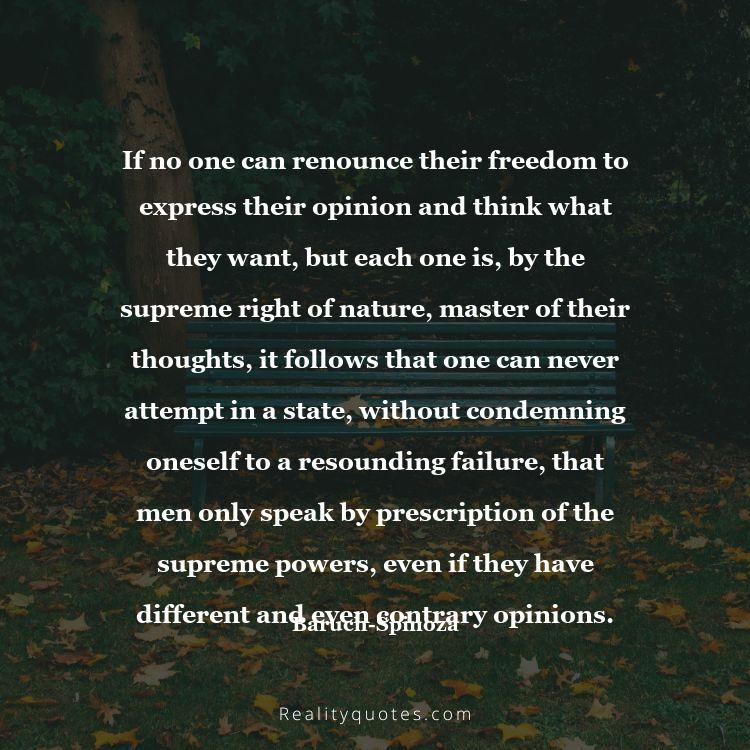
7. By law and institution of nature I do not understand anything other than the rules of the nature of each individual, according to which we conceive that each being is naturally determined to exist and to act in a precise way. ~ Baruch Spinoza
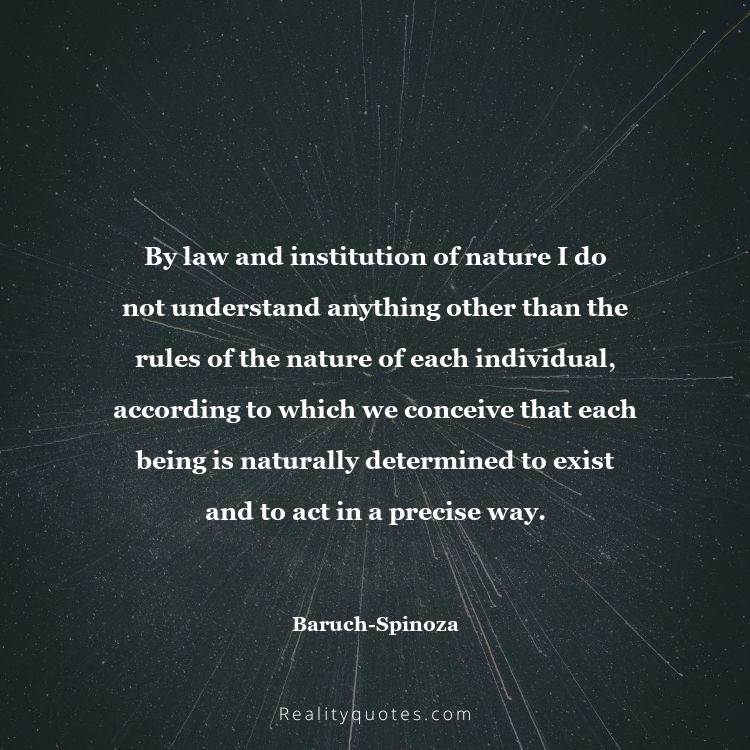
8. In order to disengage from that mob, to free our minds from the prejudices of theologians, and not recklessly embrace the inventions of men as divine doctrines, we must approach the true method of interpreting Scripture and discuss it thoroughly; since, if we do not know it, we will not be able to know with certainty what the Scripture or the Holy Spirit wants to teach. Simply put, the method of interpreting Scripture is not different from the method of interpreting nature, but is in full accord with it. ~ Baruch Spinoza
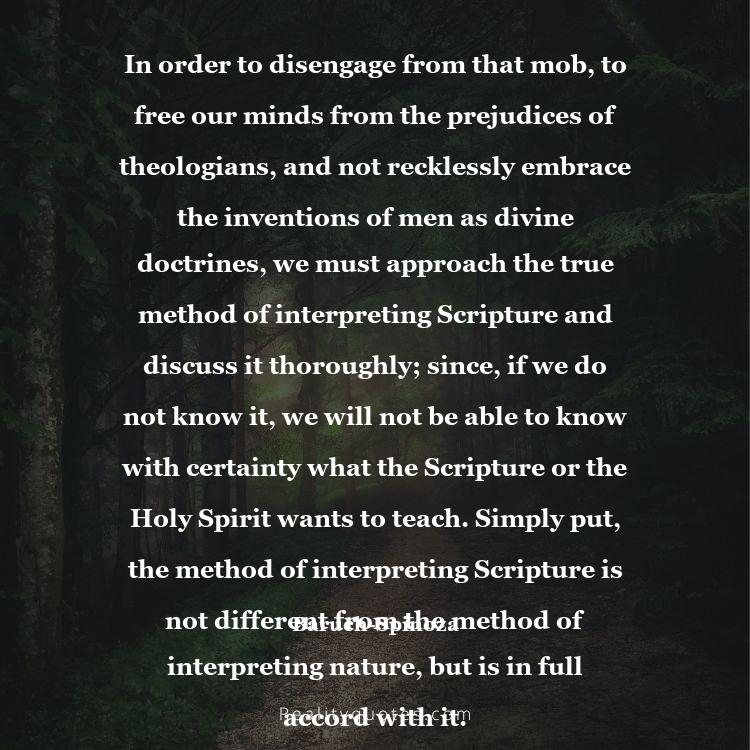
9. Those who stand out more for their imagination, have less aptitude for purely intellectual knowledge. ~ Baruch Spinoza

10 Those who stand out for their intelligence and cultivate it to the maximum, have the power to imagine more moderate and more controlled, as if they held it with a brake so that it is not confused with understanding. ~ Baruch Spinoza

10 Those who stand out for their intelligence and cultivate it to the maximum, have the power to imagine more moderate and more controlled, as if they held it with a brake so that it is not confused with understanding. ~ Baruch Spinoza

11. Everything we do must tend to progress and perfection. ~ Baruch Spinoza

12. Whoever tries to determine everything with laws, he will cause vices rather than correct them. What cannot be prohibited must be allowed, even though damage often follows from there. How many evils, indeed, do not come from luxury, envy, avarice, drunkenness and similar acts? And they are supported, however, because they cannot be avoided by the prohibition of the laws, although they are really vices. ~ Baruch Spinoza

13. The more simultaneously concurrent causes arouse an affect, the greater it is. ~ Baruch Spinoza

14. The greatest of all imperfections is not existing. ~ Baruch Spinoza

15. In any case, it is not weapons that defeat spirits, but love and generosity. ~ Baruch Spinoza

15. In any case, it is not weapons that defeat spirits, but love and generosity. ~ Baruch Spinoza

16. The academies that are formed by the State are instituted not so much to cultivate the minds, as to bridle them. ~ Baruch Spinoza

17. Enjoy pleasures to the extent that is sufficient to protect health. ~ Baruch Spinoza

18. The order and connection of ideas is the same as the order and connection of things. ~ Baruch Spinoza

19. Sin cannot be conceived in a natural state, but only in a civil state, where it is decreed by common consent what is good or bad. ~ Baruch Spinoza

20. And of all the ideas that each one has, we make a whole or, what is the same, an entity of reason, which we call understanding. ~ Baruch Spinoza
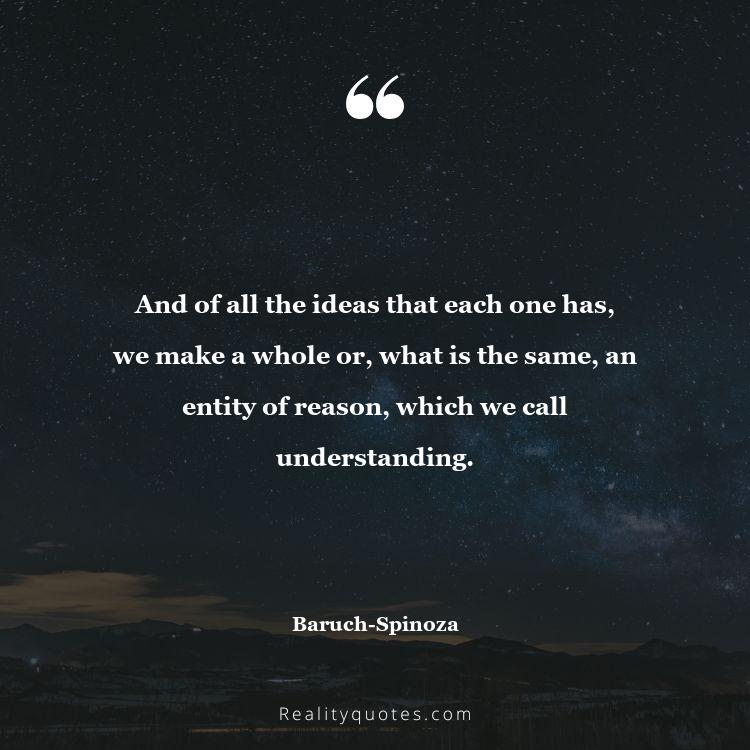
20. And of all the ideas that each one has, we make a whole or, what is the same, an entity of reason, which we call understanding. ~ Baruch Spinoza

21. The same thing can be at the same time good, bad, and indifferent. For example, music is good for the melancholy, bad for those in mourning, and neither good nor bad for the deaf. ~ Baruch Spinoza

22. I also know that it is as impossible for the common people to free themselves from superstition as it is from fear. ~ Baruch Spinoza

23. Anything that is contrary to nature is also contrary to reason, and anything that is contrary to reason is absurd. ~ Baruch Spinoza

24. Freedom of judgment must be granted, since it is a virtue and cannot be oppressed. ~ Baruch Spinoza

25. However, although natural science is divine, the name of prophets cannot be given to those who propagate it, since what they teach can be perceived and accepted by other men with equal certainty and dignity, and not by simple faith. ~ Baruch Spinoza

25. However, although natural science is divine, the name of prophets cannot be given to those who propagate it, since what they teach can be perceived and accepted by other men with equal certainty and dignity, and not by simple faith. ~ Baruch Spinoza

26. But let us suppose that this freedom is oppressed and that men are subjected to the point that they do not dare to say a word without the permission of the supreme powers. It will never be achieved with that that they do not think anything more than what they want. ~ Baruch Spinoza

27. Men are, in general, of such a nature that they bear nothing with less patience than that which is held for a crime opinions that they believe to be true. ~ Baruch Spinoza

28. Both the prince and the entire army could not be more attracted by war than by peace. Indeed, the army was formed, as we have said, only by citizens and, therefore, it was the same men who administered both war and peace matters. Hence whoever was a soldier in the camp was a citizen in the forum, and whoever was a chief in the camp was a prince in the city. No one could wish, then, war for war’s sake, but for peace and to defend freedom. ~ Baruch Spinoza

29. The most violent State will be, then, the one in which each one is denied the freedom to say and teach what he thinks; and, on the other hand, the one in which the same freedom is granted to all will be moderate. ~ Baruch Spinoza

30. Just as men have been accustomed to call that science that exceeds human capacity divine, so they have also called divine work or God’s work that work whose cause is ignored by the vulgar. ~ Baruch Spinoza

30. Just as men have been accustomed to call that science that exceeds human capacity divine, so they have also called divine work or God’s work that work whose cause is ignored by the vulgar. ~ Baruch Spinoza

31. The vulgar, in effect, believe that the power and providence of God are never as evident as when they see something unusual happen in nature and contrary to the opinion they have received about it, especially if it redounds to the benefit and own comfort. ~ Baruch Spinoza

32. The common people call the unusual works of nature miracles or works of God; And, partly out of devotion, partly out of desire to oppose those who cultivate the natural sciences, he boasts of being ignorant of natural causes and only wants to hear what he is ignorant of and, therefore, what he most admires. ~ Baruch Spinoza

33. It is called sacred and divine that object that is destined to the practice of piety and religion, and it will only be sacred while men make a religious use of it. If they cease to be pious, ipso facto he too will cease to be sacred; and, if they dedicate it to perform impious things, it will become unclean and profane the same as it was holy before. ~ Baruch Spinoza

34. Scripture usually paints God in the image of man and attributes soul, spirit, affections and even body and breath to him, due to the weak intelligence of the vulgar. ~ Baruch Spinoza

35. If you don’t want to repeat the past, study it. ~ Baruch Spinoza

35. If you don’t want to repeat the past, study it. ~ Baruch Spinoza

36. There is nothing from whose nature does not follow some effect. ~ Baruch Spinoza

37. That a finite understanding cannot understand anything by itself, unless it is determined by something external. ~ Baruch Spinoza

38. The most important activity that a human being can achieve is learning to understand, because understanding is being free. ~ Baruch Spinoza

39. The cause that gives rise to, that preserves and that fosters superstition is, then, fear. ~ Baruch Spinoza

40. I have carefully taken care not to mock human actions, not deplore them, nor hate them, but rather understand them. ~ Baruch Spinoza

40. I have carefully taken care not to mock human actions, not deplore them, nor hate them, but rather understand them. ~ Baruch Spinoza

41. Men deceive themselves by believing themselves free; and the reason for this opinion is that they are aware of their actions, but they ignore the causes because they are determined; therefore, what constitutes their idea of freedom is that they do not know any cause of their actions. ~ Baruch Spinoza

42. He who regrets what he has done is doubly miserable. ~ Baruch Spinoza

43. That which is in itself and is conceived by itself; that is, that whose concept does not need the concept of something else, from which it must be formed. ~ Baruch Spinoza
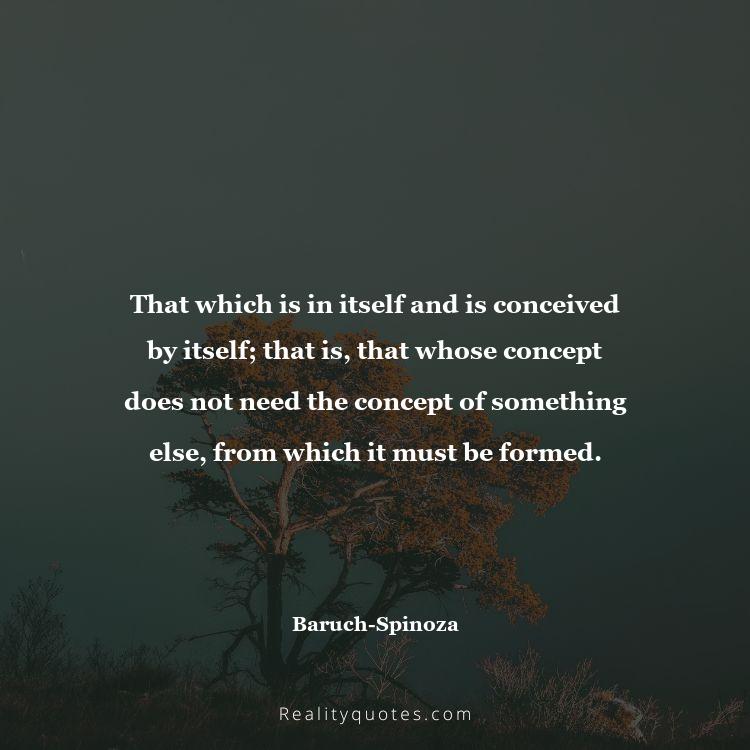
44. We have said that the soul is an idea, that it exists in the thinking thing and that it proceeds from the existence of a thing that exists in nature. ~ Baruch Spinoza

45. Everything that men decide for their well-being does not follow that it is also for the well-being of all nature, but rather, on the contrary, it can be for the destruction of many other things. ~ Baruch Spinoza

45. Everything that men decide for their well-being does not follow that it is also for the well-being of all nature, but rather, on the contrary, it can be for the destruction of many other things. ~ Baruch Spinoza

46. By God I understand an absolutely infinite being, that is, a substance consisting of infinite attributes, each of which expresses an eternal and infinite essence. ~ Baruch Spinoza

47. Only a grim and sad superstition can prohibit delight. ~ Baruch Spinoza

48. The greatest arrogance, and the greatest abjection, are the greatest ignorance of oneself. ~ Baruch Spinoza

49. Many philosophers have believed that outside the small field of the terrestrial globe, where they are, there is no other, since they do not observe it. ~ Baruch Spinoza
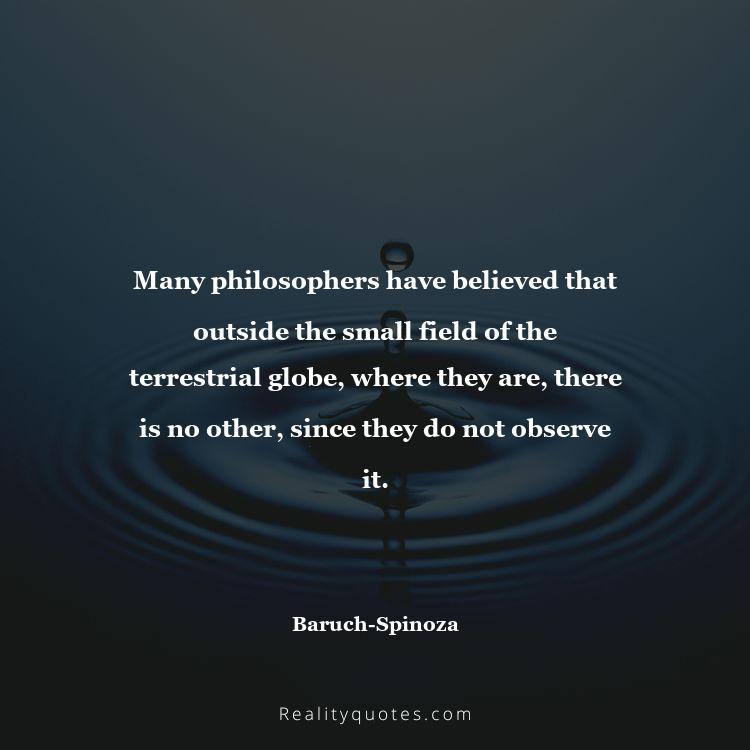
50. Most of the errors consist simply in that we do not correctly apply the names to things. ~ Baruch Spinoza

50. Most of the errors consist simply in that we do not correctly apply the names to things. ~ Baruch Spinoza

51. Society is extremely useful and equally necessary, not only to live in security against enemies, but also to have an abundance of many things; for, unless men want to collaborate with each other, they will lack art and time to sustain themselves and preserve themselves as well as possible. ~ Baruch Spinoza

52. Flattery also engenders concord, but through the repugnant vice of servility or perfidy. ~ Baruch Spinoza

53. The arrogant, who want to be first, by not being, are the ones who more easily fall into the nets of flattery. ~ Baruch Spinoza

54. If man has an idea of God, God must exist formally. ~ Baruch Spinoza

55. That which is not loved, never causes fights, nor sadness, nor laziness, nor envy, if another possesses it, nor fear nor hatred nor, in a word, no interior commotion. ~ Baruch Spinoza

55. That which is not loved, never causes fights, nor sadness, nor laziness, nor envy, if another possesses it, nor fear nor hatred nor, in a word, no interior commotion. ~ Baruch Spinoza

56. Only that which exists by the needs of his own nature is free, and is influenced in his actions only by himself. ~ Baruch Spinoza

57. The true freedom of man has to do with strength, that is, with firmness and generosity. ~ Baruch Spinoza

58. The search for honors and riches also distracts the mind, and not a little, especially when they are sought for themselves, since then they are considered the highest good. ~ Baruch Spinoza

59. The purpose of the ceremonies was, then, this: that men did nothing by their own decision, but everything by someone else’s mandate and that with their actions and considerations they left evidence that they were not autonomous, but totally dependent on another. ~ Baruch Spinoza

60. A free man thinks of nothing less than death, and his wisdom is not a meditation on death, but on life. ~ Baruch Spinoza

60. A free man thinks of nothing less than death, and his wisdom is not a meditation on death, but on life. ~ Baruch Spinoza

61. Perhaps someone thinks, however, that in this way we turn subjects into slaves, believing that he is a slave who acts by an order, and free who lives as he pleases. But this is far from being true, since, in reality, whoever is driven by his appetites and is unable to see or do anything that is useful to him, is a slave to the maximum. ~ Baruch Spinoza
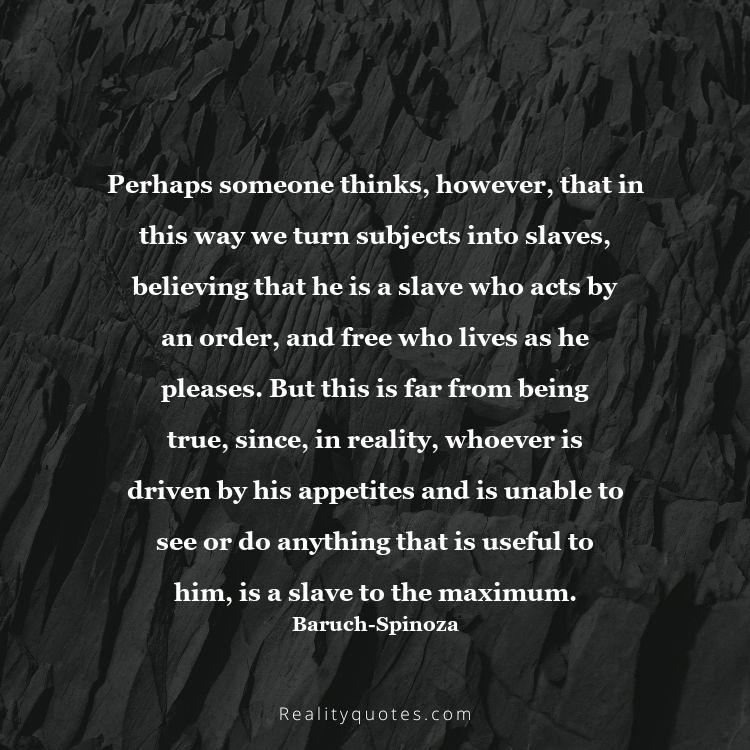
62. The human soul is apt to perceive many things, and the more apt the more ways his body can be arranged. ~ Baruch Spinoza

63. All things in nature are either things or actions. Now, good and evil are not things or actions. Therefore good and evil do not exist in nature. ~ Baruch Spinoza

64. It is not obedience, but the end of the action, which makes one a slave. If the end of the action is not the utility of the agent himself, but the one he commands, then the agent is a slave and useless for himself. ~ Baruch Spinoza

65. Don’t cry. Don’t be outraged. He understands. ~ Baruch Spinoza

65. Don’t cry. Don’t be outraged. He understands. ~ Baruch Spinoza

66. What Paul says about Peter tells us more about Paul than about Peter. ~ Baruch Spinoza

67. When a man is prey to his emotions, he is not his own master. ~ Baruch Spinoza

68. Don’t be surprised by new ideas; because you know well that a thing does not cease to be true because it is not accepted by many. ~ Baruch Spinoza

69. The effort to understand is the first and only basis of virtue. ~ Baruch Spinoza

70. There is no hope that is not mixed with fear, nor fear that is not mixed with hope. ~ Baruch Spinoza

70. There is no hope that is not mixed with fear, nor fear that is not mixed with hope. ~ Baruch Spinoza

71. Pride is the pleasure that arises from the thought of a man too high of himself. ~ Baruch Spinoza

72. Do not laugh, do not regret, do not hate, but understand. ~ Baruch Spinoza

73. Do not despise human actions, but understand them. ~ Baruch Spinoza

74. Also, I beg you to conceive that a stone, while it continues to move, must be able to think and know that it strives, as far as possible, to continue moving. ~ Baruch Spinoza

75. Those who know the true use of money, and regulate the measure of wealth according to their needs, live content with few things. ~ Baruch Spinoza

75. Those who know the true use of money, and regulate the measure of wealth according to their needs, live content with few things. ~ Baruch Spinoza

76. Whoever wants to avenge the injuries caused by mutual hatred will live in misery. ~ Baruch Spinoza

77. No matter how thin you cut it, there will always be two sides. ~ Baruch Spinoza

78. All excellent things are as difficult as they are rare. ~ Baruch Spinoza

79. Peace is not the absence of war, it is a virtue, a state of mind, a disposition for benevolence, trust, justice. ~ Baruch Spinoza

80. We feel and know that we are eternal. ~ Baruch Spinoza

80. We feel and know that we are eternal. ~ Baruch Spinoza

